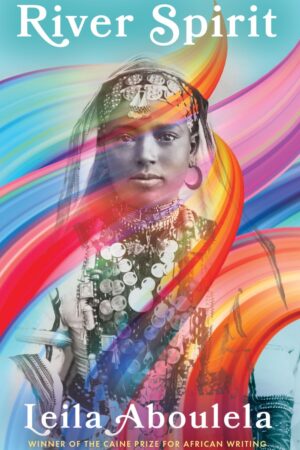River Spirit
by Leila Aboulela
reviewed by Semmi W.
The Sudanese-Egyptian author Leila Aboulela’s new novel, River Spirit, is an immersive experience. It’s 1881 in Sudan, and quickly you, the reader, are transported to the Nuba Mountains. Despite the political chaos, you become comfortable in the environment, silently observing, agreeing or disagreeing with each event and action as it unfolds. So many new people populate your world—even if they don’t know you, Aboulela’s mastery of detail gives you an affinity for each character. You may not be going through their exact pains or worries, but you begin to understand.
African traditions are largely oral. Heritage is passed down through gatherings, stories, proverbs, music, and poetry. The act of recording this story is revolutionary because so much of what is taken for granted—or brushed aside—in East African heritage is explained in the life of Akuany, the main character. You grow with her. As bits of her world change, you are reminded of contemporary life and what has been lost in the meantime. Akuany’s sense of community, connection to nature, and perseverance are shared in varying degrees with all the characters around her. Technology and corporatism have not yet desensitized daily life in River Spirit. Curiosity draws us into her world—Akuany’s relations, joys, burdens, tasks, and connection to the land captivates us in part because our own has become automated.
River Spirit is beautifully complex. Each chapter is narrated by a different character, but always the story connects back to Akuany. Aboulela peels away the layers of Sudan’s history under the Ottoman Empire, during the Mahdist War, and in the years leading up to British/Egyptian colonial rule. One character, Musa, expresses his frustration at the changing of the guard, asking, “Why should a foreigner order me around? If he’s the one on the horse, then let him scamper past my broken cart.”
Against this history, River Spirit is a coming-of-age story about Akuany and Yaseen, a merchant from Khartoum and a guardian of sorts. When she meets Yaseen, Akuany, along with her younger brother, is an orphan; Yaseen promises to look out for both of them. Aboulela takes readers through cities, markets, the desert, homes, and parts of the Nile River, tracking Akuany’s journey as well as the lives of many other characters. At the end of each chapter, you are left with a feeling of wonder. No matter who is narrating, you are engaged. Sometimes you even want to argue with a character. When Akuany sees a mirror for the very first time, you want Nazli, the woman near her, to stop making fun of her.
“It’s you, fool,” screeched Nazli Hanim. “In the mirror … Do you like what you see?” She nodded. Very much. The girl in the mirror was pretty. “Fool,” said Nazli. “Wait till I’m done with you. Wait till I fumigate you and dress you properly. And you need a new name too.”
Throughout the book you are left speculating: What will happen to Akuany now? Whose side of the story will I hear next?
River Spirit is the first installment in a planned cycle of historical novels connecting Sudan to Scotland. While researching, Aboulela discovered that many Scots played a key role in Britain’s colonial administration. Setting the story in Sudan from 1879–1881, Aboulela draws attention to a topic underdiscussed in popular culture and even academia: the East African slave trade. The author bravely shows how language, religion, economics, colorism, class, and family mesh across tribes. Through the trading of human life, new cultures and solidarities form. Hostilities and enmities bloom.
Even though the British Empire technically abolished slavery in 1807, in River Spirit you learn how merchants continued to ply their trade. The East African slave trade mostly focused on gathering domestic servants, concubines, and workers for clove and spice farms. Turkish merchants from the Ottoman Empire, European colonizers, warring African tribes, and Brazilian merchants all sold and traded people up and down the Nile, along the Red Sea, and across the Indian Ocean. In River Spirit, the slave trade acts as a backdrop for the novel’s action. Other political and cultural factors run through the novel, but slavery plays a decisive role in the lives of Akuany, Yaseen, and their families.
At first glance, River Spirit seems like a tale of political corruption. Through everyday details, Aboulela shows how Sudan and South Sudan have been impacted by colonial forces, the Ottoman Empire, and the slave trade; but the novel is ultimately a love story. No matter how many times Akuany moves or is traded to different homes, she and Yaseen always connect back with each other.
Each chapter of River Spirit is a snapshot, reflecting how simple actions or words have the power to change the course of our daily realities—whom we meet, where we live, what we do. The book invites readers to question the very meaning of belonging and family. For readers who don’t know much about Sudan or its history, this novel is a beautiful way to be introduced. If, like me, you happen to be East African and living in the diaspora, Aboulela’s vibrant writing reminds you of your own ancestors and their sacrifices. It fills you with a sense of longing. Even if “back home” has no real address, you realize exactly where you belong reading this novel.
Published on May 30, 2023

